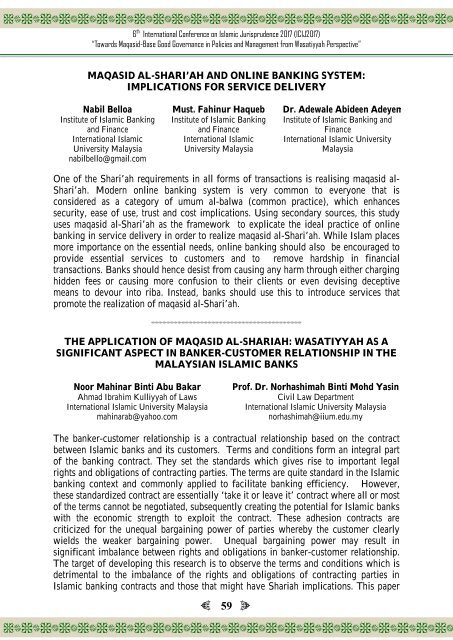PROGRAMME ABSTRACT BOOK
Program%20Book%20ICIJ2017%20-final%2016%20-%202-%202017
Program%20Book%20ICIJ2017%20-final%2016%20-%202-%202017
You also want an ePaper? Increase the reach of your titles
YUMPU automatically turns print PDFs into web optimized ePapers that Google loves.
6 th International Conference on Islamic Jurisprudence 2017 (ICIJ2017)<br />
“Towards Maqasid-Base Good Governance in Policies and Management from Wasatiyyah Perspective”<br />
<br />
MAQASID AL-SHARI’AH AND ONLINE BANKING SYSTEM:<br />
IMPLICATIONS FOR SERVICE DELIVERY<br />
Nabil Belloa<br />
Institute of Islamic Banking<br />
and Finance<br />
International Islamic<br />
University Malaysia<br />
nabilbello@gmail.com<br />
Must. Fahinur Haqueb<br />
Institute of Islamic Banking<br />
and Finance<br />
International Islamic<br />
University Malaysia<br />
Dr. Adewale Abideen Adeyemic<br />
Institute of Islamic Banking and<br />
Finance<br />
International Islamic University<br />
Malaysia<br />
One of the Shari’ah requirements in all forms of transactions is realising maqasid al-<br />
Shari’ah. Modern online banking system is very common to everyone that is<br />
considered as a category of umum al-balwa (common practice), which enhances<br />
security, ease of use, trust and cost implications. Using secondary sources, this study<br />
uses maqasid al-Shari’ah as the framework to explicate the ideal practice of online<br />
banking in service delivery in order to realize maqasid al-Shari’ah. While Islam places<br />
more importance on the essential needs, online banking should also be encouraged to<br />
provide essential services to customers and to remove hardship in financial<br />
transactions. Banks should hence desist from causing any harm through either charging<br />
hidden fees or causing more confusion to their clients or even devising deceptive<br />
means to devour into riba. Instead, banks should use this to introduce services that<br />
promote the realization of maqasid al-Shari’ah.<br />
<br />
THE APPLICATION OF MAQASID AL-SHARIAH: WASATIYYAH AS A<br />
SIGNIFICANT ASPECT IN BANKER-CUSTOMER RELATIONSHIP IN THE<br />
MALAYSIAN ISLAMIC BANKS<br />
Noor Mahinar Binti Abu Bakar<br />
Ahmad Ibrahim Kulliyyah of Laws<br />
International Islamic University Malaysia<br />
mahinarab@yahoo.com<br />
Prof. Dr. Norhashimah Binti Mohd Yasin<br />
Civil Law Department<br />
International Islamic University Malaysia<br />
norhashimah@iium.edu.my<br />
The banker-customer relationship is a contractual relationship based on the contract<br />
between Islamic banks and its customers. Terms and conditions form an integral part<br />
of the banking contract. They set the standards which gives rise to important legal<br />
rights and obligations of contracting parties. The terms are quite standard in the Islamic<br />
banking context and commonly applied to facilitate banking efficiency. However,<br />
these standardized contract are essentially ‘take it or leave it’ contract where all or most<br />
of the terms cannot be negotiated, subsequently creating the potential for Islamic banks<br />
with the economic strength to exploit the contract. These adhesion contracts are<br />
criticized for the unequal bargaining power of parties whereby the customer clearly<br />
wields the weaker bargaining power. Unequal bargaining power may result in<br />
significant imbalance between rights and obligations in banker-customer relationship.<br />
The target of developing this research is to observe the terms and conditions which is<br />
detrimental to the imbalance of the rights and obligations of contracting parties in<br />
Islamic banking contracts and those that might have Shariah implications. This paper<br />
59


